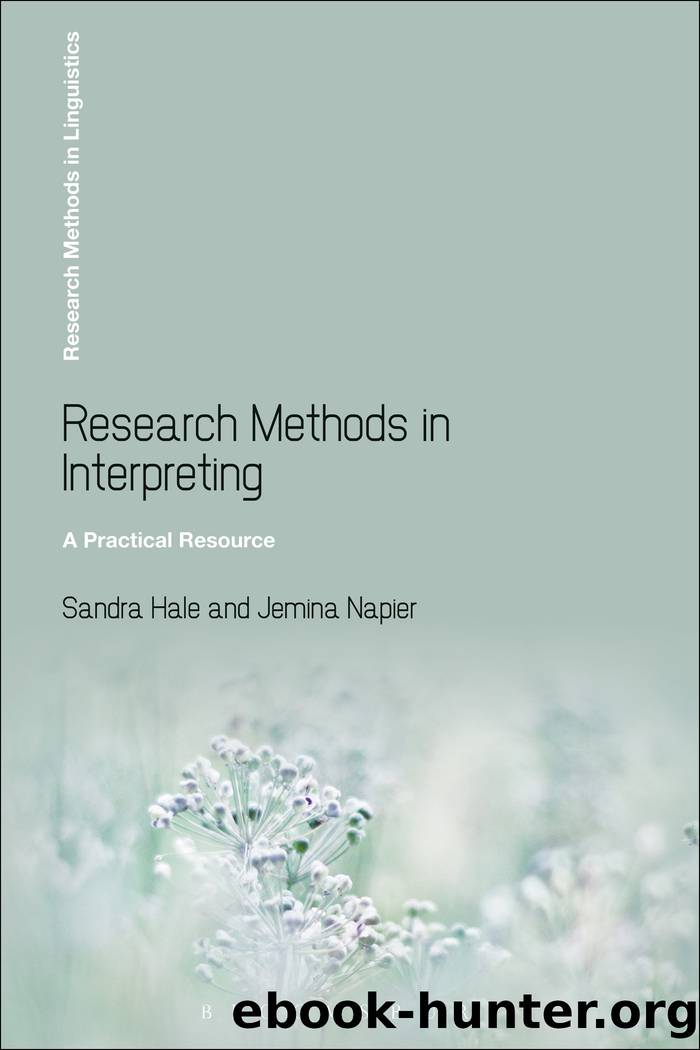Research Methods in Interpreting by Hale Sandra;Napier Jemina;Napier Jemina; & Jemina Napier

Author:Hale, Sandra;Napier, Jemina;Napier, Jemina; & Jemina Napier
Language: eng
Format: epub
Publisher: Bloomsbury Publishing Plc
5.5.3 Steps to conducting DA in Interpreting research
We provided a basic description of the methods used by three groups of researchers to analyse interpreted data. We recommend that you read those references in detail to gain a better understanding of the methodology used, including the theoretical frameworks adopted by each of the studies. As evidenced by the cited studies, and as we expressed at the commencement of the chapter, there is no rigid way of conducting discourse analysis. Nevertheless, below we offer some basic guidelines to get you started.
1 Decide on the setting or domain you would like the discourse to come from â for example: medical, legal, business, education, conference.
2 Decide on the genre â for example: doctor-patient consultation, multi-party negotiation, hearing or trial, police interrogation, parent-teacher interview, media interview.
3 Decide on the mode of interpreting â for example: face-to-face interpreting, telephone interpreting, interpreting via video conference, simultaneous or consecutive interpreting.
4 Decide on the data to be analysed â for example: audio or video recordings of authentic interpreted interactions or interpreted speech; audio or video recordings of simulated interpreted interactions or interpreted speech; transcriptions of interpreted interactions or interpreted speech (these could be also part of a publicly available corpus).
5 Decide on the approach to be taken â for example: will you take a bottom-up or a top-down approach? Will you take approaches 1, 2 or 3 above (see point 5.5.1) or a combination of all three?
6 Decide on the theoretical framework â for example: will you follow a specific theoretical framework such as conversation analysis or critical discourse analysis or systemic functional linguistics? Or will you adopt a more eclectic approach drawing on different theories and methods?
7 Decide on what will be analysed â for example: will you take a grammatical approach and identify the way certain parts of speech or different syntactic structures are used in different contexts by different participants? Or will you take a more pragmatic approach and analyse, for example, the way politeness is interpreted or issues of alignment and footing? Or will you take more of a critical discourse analysis approach and analyse issues of power as expressed through the distribution of turns, the way speech overlaps or the forcefulness of the language used by different participants?
Download
This site does not store any files on its server. We only index and link to content provided by other sites. Please contact the content providers to delete copyright contents if any and email us, we'll remove relevant links or contents immediately.
Cecilia; Or, Memoirs of an Heiress — Volume 1 by Fanny Burney(31360)
Cecilia; Or, Memoirs of an Heiress — Volume 3 by Fanny Burney(30958)
Cecilia; Or, Memoirs of an Heiress — Volume 2 by Fanny Burney(30914)
The Lost Art of Listening by Michael P. Nichols(6495)
We Need to Talk by Celeste Headlee(4892)
Asking the Right Questions: A Guide to Critical Thinking by M. Neil Browne & Stuart M. Keeley(4612)
On Writing A Memoir of the Craft by Stephen King(4233)
Dialogue by Robert McKee(3599)
I Have Something to Say: Mastering the Art of Public Speaking in an Age of Disconnection by John Bowe(3526)
Pre-Suasion: A Revolutionary Way to Influence and Persuade by Robert Cialdini(3433)
Elements of Style 2017 by Richard De A'Morelli(2949)
The Book of Human Emotions by Tiffany Watt Smith(2783)
Good Humor, Bad Taste: A Sociology of the Joke by Kuipers Giselinde(2564)
Name Book, The: Over 10,000 Names--Their Meanings, Origins, and Spiritual Significance by Astoria Dorothy(2501)
Fluent Forever: How to Learn Any Language Fast and Never Forget It by Gabriel Wyner(2461)
The Grammaring Guide to English Grammar with Exercises by Péter Simon(2402)
Why I Write by George Orwell(2370)
The Art Of Deception by Kevin Mitnick(2308)
Don't Sleep, There Are Snakes by Daniel L. Everett(2225)
